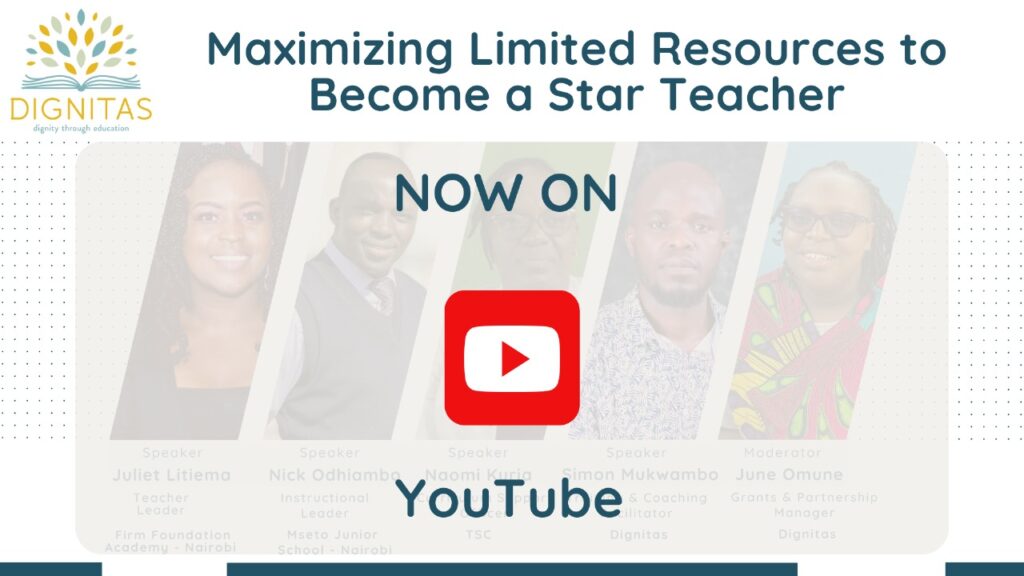Teaching in low-resource communities can be both challenging and rewarding. Educators often face significant obstacles, including a lack of resources and support, which can impact their motivation and the learning outcomes of their students. However, these challenges also present unique opportunities for creativity and innovation in Teacher Professional Development (TPD).
On July 24, our recent webinar brought together passionate educators—Juliet litiema(A teacher at Firm Foundation Academy), Nicholas Odhiambo (HeadTecher at Mseto Junior School), Naomi Kuria– Curriculum Support Officer at TSC in Machakos County), and Simon Mukwambo (An Instructional coach at Dignitas)—to discuss the importance of maximizing limited resources to become “star teachers.” Their insights and experiences highlighted practical strategies that empower teachers to thrive in resource-scarce environments.
A star teacher understands the impact of their work and creates a safe environment for all” ~ Simon Mukwambo
The Reality of Low-Resource Communities
Tr. Juliet, a dedicated early years teacher at Firm Foundation, shared her firsthand experience with the lack of essential resources for learning. “The absence of continuous teacher development is a significant challenge in low-resource communities,” she emphasized. Without the necessary tools and support, effective teaching becomes nearly impossible.
Naomi, a Curriculum Support Officer (CSO) with the Teachers Service Commission (TSC), acknowledged these challenges. “We work within the education system to help teachers improvise resources and interpret the curriculum,” she explained. Naomi’s role is crucial, as she empowers teachers to adapt their teaching methods to make the most of limited resources, particularly in implementing the Competency-Based Curriculum (CBC).
Innovative Approaches to Teacher Professional Development
Simon, a dedicated coach, highlighted the importance of listening to teachers and understanding their needs. “We need to help them see their impact in their roles and engage parents in the educational process,” he said. By focusing on building relationships and fostering parent involvement, Simon emphasizes the holistic nature of education. “At Dignitas, we bring in a unique model towards coaching, to listen more to what gaps are there, and come in with a targeted intervention so that we can can support teachers better”
Tr. Nicholas, the headteacher at Mseto High School, added that creating a supportive environment is vital for teachers’ success. He noted, “Fostering open communication and recognizing achievements helps build a culture of continuous support.” By encouraging creativity and innovation among staff, Nicholas is setting the stage for a thriving educational community.
Click the on below image to watch the full webinar

The Power of Mindset Change
Throughout the discussion, the concept of mindset change emerged as a pivotal theme. Tr. Juliet shared how participating in Dignitas’ Leadership Academy transformed her perspective as an educator. “We learned that there is always room to grow as a teacher, and that we can maximize the resources around us,” she stated. This growth mindset has led to improved collaboration among teachers, as they come together in Professional Learning Communities (PLCs) to share best practices and support one another.
Naomi (CSO) echoed this sentiment, emphasizing the importance of continuous learning and lesson observation. “As CSOs, we conduct lesson observations to help teachers refine their pedagogy,” she explained. This feedback loop fosters professional growth and ultimately leads to better outcomes for students in low resource communities.
Creating Stronger Connections with Parents
Engaging parents in the learning process is essential for fostering a supportive educational environment. Tr. Nicholas highlighted the significance of inviting parents into the classroom. “By allowing parents to observe lessons, we create an open atmosphere where they can understand the teaching process,” he shared. This involvement not only strengthens the relationship between teachers and parents but also enhances the support students receive at home.
Coach Simon added that parents can serve as valuable resources, bringing their expertise into the classroom. “When parents participate in lessons, they gain insight into their children’s education and become more invested in the learning journey,” he explained.
Defining a Star Teacher
As the webinar wrapped up, the panelists shared their thoughts on what makes a star teacher. According to Naomi, a star teacher is one who communicates effectively, prepares professional documents, and demonstrates a passion for their craft. Simon emphasized the importance of inspiring confidence in students, parents, and colleagues alike. “A star teacher understands the impact of their work and creates a safe environment for all,” he said.
Tr. Juliet added that the learner should always be at the center of education. “A star teacher knows that the ultimate goal is to support students in their learning journey,” she stated.
A Collective Effort for Change
The insights shared by Tr. Juliet, Tr. Nicholas, Naomi, and Coach Simon illustrate the powerful impact that dedicated educators can have in marginalized communities. By addressing the challenges of TPD, fostering a growth mindset, and engaging parents, these educators are transforming their schools and enriching the lives of their students.
As we reflect on the insights shared during this webinar, it is clear that empowering teachers is not just a professional responsibility but a collective effort that requires collaboration, innovation, and a commitment to continuous improvement.
Watch the full webinar video here
Follow us on socials as we continue to equip and empower educators in underserved communities who will transform opportunities for the next generation.

